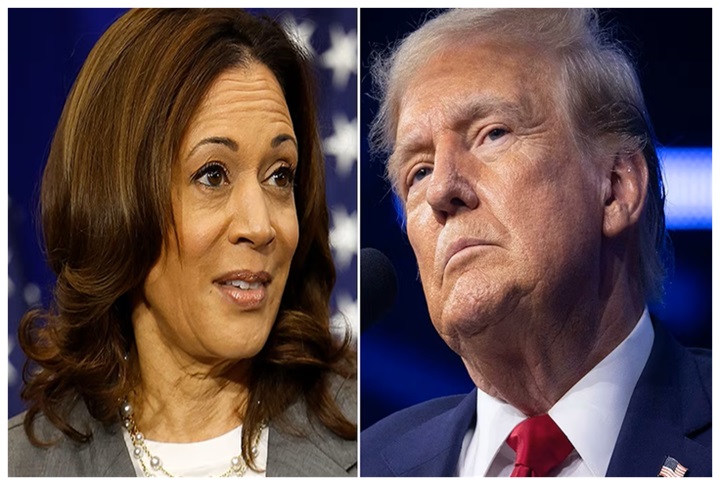In the lead-up to what is anticipated to be one of the most contentious elections in recent American history, former U.S. President Donald Trump, who is the Republican Party’s candidate, has made a rather unorthodox claim, stating that he is “much better looking” than his opponent, Vice President Kamala Harris.
Trump’s comments were made during a campaign rally in Wilkes-Barre, Pennsylvania, where he addressed his supporters with his characteristic bravado and unfiltered remarks.
Trump’s comment came in response to a recent *Time Magazine* cover featuring Kamala Harris, the Democratic Party’s candidate for the upcoming presidential election.

The former president dismissed the portrait on the magazine cover, insisting that it was not a photograph but a drawing.
He suggested that the publication had employed an illustrator to enhance Harris’s appearance, claiming, “They took a lot of pictures that didn’t work out, so they hired a sketch artist.”
Continuing his critique, Trump remarked, “I think I’m much better looking. I’m a better-looking person than Kamala.”
Though his statement was met with laughter and applause from the crowd, it was clear that Trump intended his remarks to be more than just light-hearted banter.
By challenging Harris’s appearance, Trump sought to undermine his opponent in a manner that has become typical of his political style—mixing humour with pointed jabs at his rivals.
Despite his criticism, Trump did concede that Kamala Harris is a “beautiful” woman, albeit with the caveat that he still considers himself more attractive.
This backhanded compliment was part of a broader attempt to position himself as more relatable and appealing to the American electorate, a strategy he has employed throughout his political career.
Trump’s comments reflect his ongoing campaign strategy, which relies heavily on his ability to dominate the media narrative and energise his base with bold, often controversial, statements.
His rally in Pennsylvania is just one of many stops on his campaign trail, where he continues to draw large crowds and maintain his influence within the Republican Party.
As the 2024 election approaches, the race between Donald Trump and Kamala Harris is expected to be fiercely competitive.
Harris, who ascended to the top of the Democratic ticket after President Joe Biden decided to step down due to health concerns, faces the monumental task of unifying a party that has seen internal divisions in recent years.
Biden’s endorsement of Harris has solidified her position as the Democratic standard-bearer, but it also places her directly in the crosshairs of Trump’s relentless campaigning.
The upcoming election is shaping up to be a defining moment in American politics. Trump, who served as the 45th President of the United States from 2017 to 2021, remains a polarising figure.
His tenure in office was marked by a series of controversies, yet he retains a loyal base of supporters who believe in his vision of “Making America Great Again.”
On the other hand, Kamala Harris represents a historic candidacy, as she would be the first woman and first person of African and South Asian descent to be elected President of the United States.
Her candidacy symbolises a continuation of the progressive policies championed by the Biden administration, but it also brings new challenges as she steps into the role of presidential contender.
Trump’s remarks about Harris are not surprising given his track record.
Throughout his political career, Trump has often used personal attacks as a tactic to discredit his opponents, diverting attention from policy discussions to focus on character and appearance.
This strategy has been effective in rallying his base, but it has also drawn criticism for lowering the tone of political discourse.
For Kamala Harris, the challenge will be to rise above such attacks and focus on presenting a vision for America’s future that resonates with a diverse electorate.
Harris has already demonstrated her resilience and political acumen, having served as Vice President during a period of significant national and global challenges.
Her ability to articulate her policies and connect with voters on issues like healthcare, climate change, and social justice will be crucial in her bid to counter Trump’s influence.
As both candidates continue to prepare for what is likely to be an intense campaign, the American public will be watching closely.
The outcome of the 2024 election will have far-reaching implications not just for the United States, but for the global political landscape.
Trump’s assertion that he is “better looking” than Harris may grab headlines, but the election will ultimately be decided on issues far more substantial than appearances.
In the final analysis, the clash between Trump and Harris represents more than just a battle of personalities—it is a contest between two very different visions for the future of America.
The stakes could not be higher, and as the campaign progresses, the rhetoric is only expected to intensify.
Whether Trump’s unconventional approach will secure him a return to the White House, or whether Harris will make history as the first female president, remains to be seen.
What is certain, however, is that this election will be one for the history books.
Support InfoStride News' Credible Journalism: Only credible journalism can guarantee a fair, accountable and transparent society, including democracy and government. It involves a lot of efforts and money. We need your support. Click here to Donate
